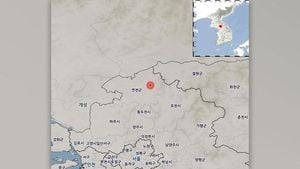The United Kingdom has made a significant leap in space research by borrowing lunar samples from China, marking the first time in nearly fifty years that such samples have been made available for study. These samples, consisting of fine lunar dust, arrived in Britain and are being securely stored at a high-security facility in Milton Keynes. This event is seen as a landmark in international scientific cooperation in the field of space sciences, according to the BBC.
The sole scientist in the UK with the opportunity to study these samples is Professor Mahesh Anand, who expressed his pride in obtaining them, stating they are "more valuable than gold." Anand remarked, "No research in the world had previously had the opportunity to access all the Chinese samples from the Moon, and this is a great privilege for us." These samples were collected during the Chinese space mission "Chang'e 5" in 2020, when the spacecraft landed in a volcanic region known as "Mons Rumker" on the Moon's surface. This mission is notable as the first successful attempt to retrieve lunar samples since the Soviet mission in 1976.
The British team is employing advanced technologies, including laser treatment, to study the samples. Their goal is to uncover evidence supporting the theory that the Moon was formed as a result of a colossal collision between Earth and a planet-sized object roughly 4.5 billion years ago. Scientists hope that the particles will provide crucial insights into the Moon's formation and the early history of the solar system.
In a separate yet equally intriguing development, Egyptian novelist Shaaban Youssef has ventured into fiction for the first time at the age of seventy, releasing his debut novel titled "Awdat Sayyid Al-Ahmar" (The Return of Sayyid Al-Ahmar). This novel, which is already in the works for a sequel, takes place over a mere three days and delves into the lives of ordinary people grappling with the aftermath of the 1967 defeat and the subsequent resignation of President Gamal Abdel Nasser.
In this engaging narrative, Sayyid Al-Ahmar, the protagonist, creates his own legend. Upon hearing news of the defeat, he is consumed by anger and shock, smashing a wall with his body before disappearing from sight, prompting a frantic search for him. Youssef describes how the novel revisits the grand themes characteristic of the literature from the 1960s, where characters suffer from the tragedy of the 1967 war, experience acute fear, and eventually regain hope with Nasser's return from resignation.
"Yes, that’s what I lived through and witnessed," Youssef reflected. He noted that people experienced daily panic without a clear political awareness of their surroundings, relying instead on political reports from the radio and lengthy analytical articles in newspapers that only a small segment of society read. The community comprised students, intellectuals, and rebels, with his character, Sayyid, coming from the far south to seek a better life and marry, only to find his disappearance symbolizing the fears of an average family in a working-class neighborhood.
The novel also explores the love story between Sayyid and his beloved, Tighana, as well as the solidarity that emerges among people during significant crises. Youssef emphasizes that this solidarity is often latent but becomes evident in critical moments. He notes that while individuals may harbor grievances against one another, they come together to support one another in times of joy and sorrow.
The narrative culminates in a poignant scene where Sayyid Al-Ahmar returns from his mysterious absence, coinciding with Nasser's decision to retract his resignation. Youssef intended for these two returns to mirror each other, highlighting that Sayyid's struggles are emblematic of the nation's plight, despite the differing forms of their respective tragedies.
The novel also portrays strong female characters, particularly Sayyid's aunt, who defy traditional gender roles. Youssef remarked that the women in his novel reflect the realities of his own life, noting that they often lead discussions and decision-making in familial matters, a dynamic he observed growing up. His aunt Halima, for example, was known for her commanding presence in family councils, where her opinions were respected and followed.
Youssef's ability to transform ordinary details into legendary scenes is a hallmark of his writing. He recalls that moments he now views as legendary were, at the time, simply part of everyday life. For instance, the scene where Sayyid hears the sounds of bombs and aircraft overhead, leading to his panic and subsequent disappearance, resonates with the collective trauma experienced by many during that period.
The atmosphere leading up to the 1967 defeat was charged, with patriotic songs dominating the airwaves and powerful headlines in the press. Youssef captures this milieu in his novel, portraying how the community reacted to the unfolding events. He believes that storytelling is a central element of literature, asserting that without a compelling narrative, a novel lacks the ability to engage readers fully.
Reflecting on nostalgia for the past, Youssef expresses a fascination with how echoes of history resonate in the present. He notes that language and expressions evolve, yet the richness of Egypt's linguistic heritage remains preserved in literature.
Youssef's shift to writing fiction, despite his long-standing commitment to poetry, stemmed from a deep-seated narrative instinct that he could no longer ignore. He humorously recalls how he once resisted the idea of writing a novel, only to find himself compelled to do so after encouragement from peers.
As he embarks on writing the sequel to his debut novel, Youssef contemplates expanding the story into a trilogy, exploring deeper character development and themes. He reflects on the differences between his generation and subsequent ones, noting that while his generation was characterized by romantic ideals, younger generations tend to be more pragmatic.
Both the lunar samples from China and Youssef's literary endeavors represent significant milestones in their respective fields, showcasing the power of collaboration and creativity in advancing knowledge and understanding.




